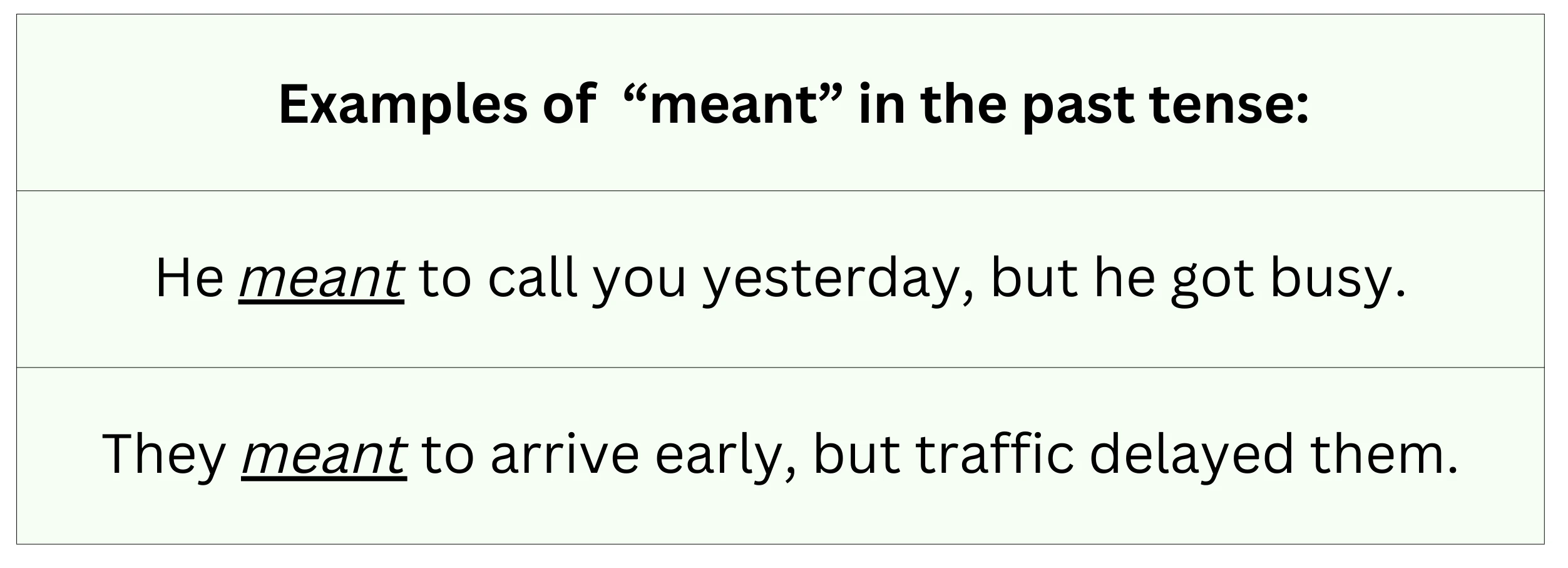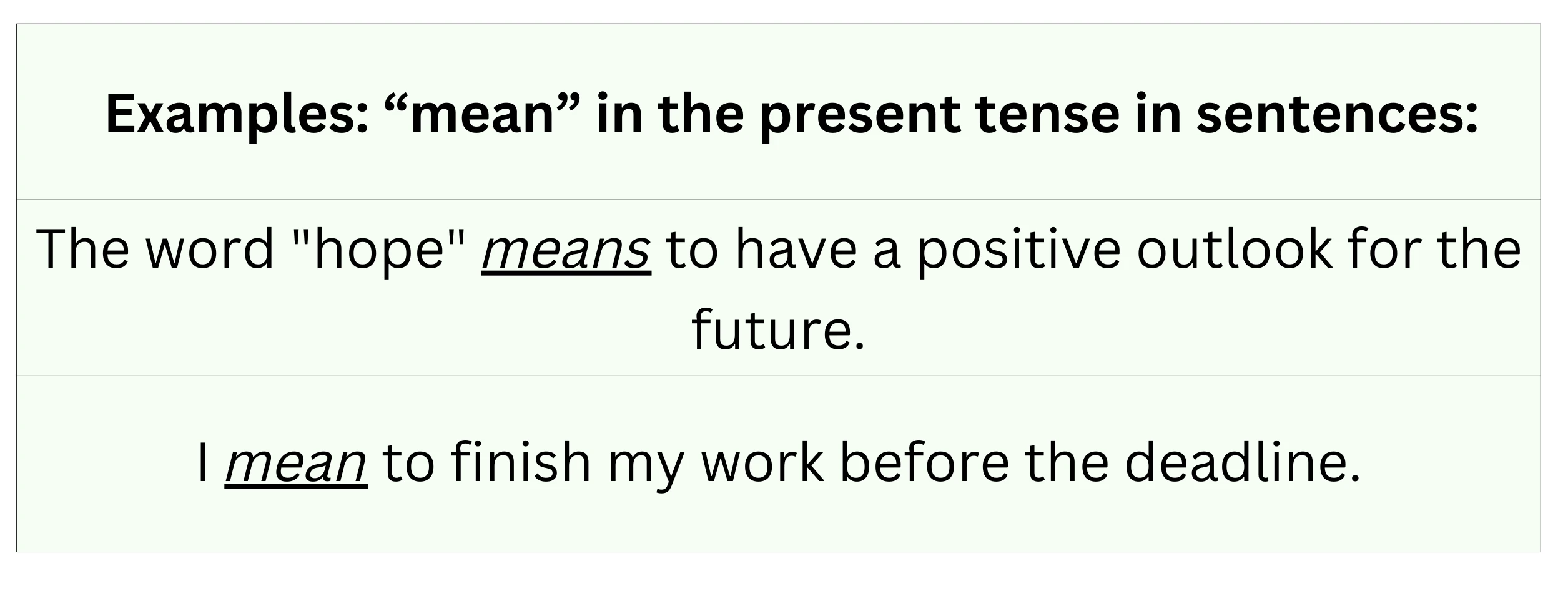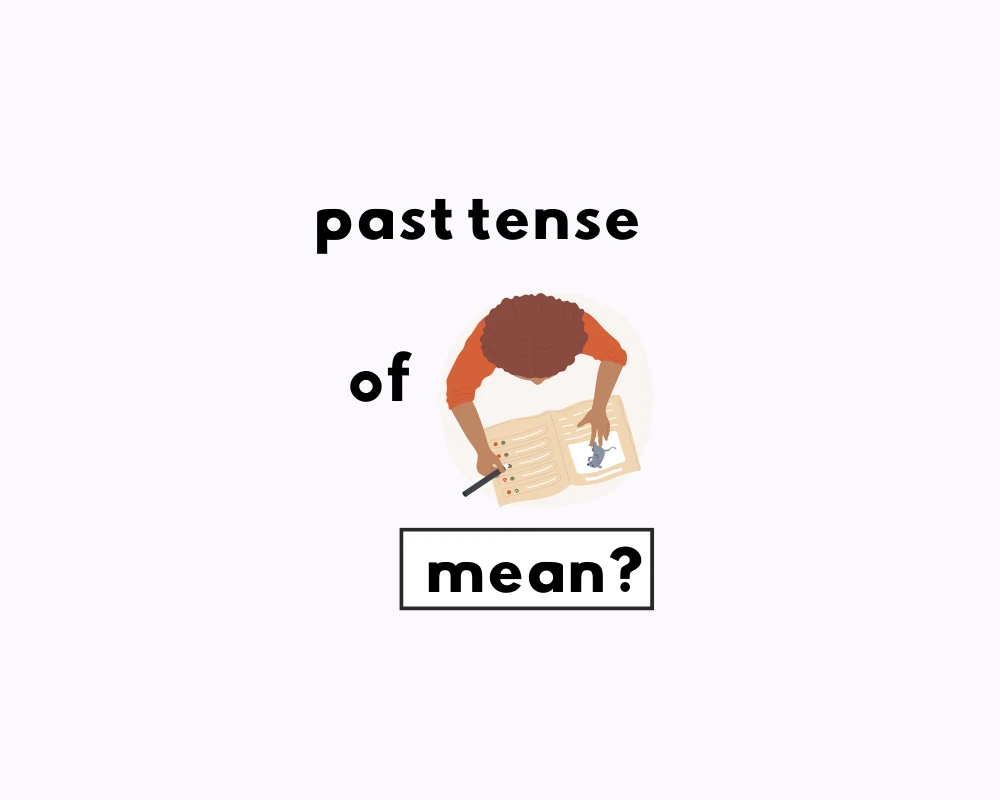
Contents
Toggle
What do you mean or meant?
The irregular verb, mean, (present tense) is debatably one of the most commonly used words in the English language. We use the word ‘mean‘ to ask what something refers to, i.e., ‘what does that mean?’ Mean is also a homophone, and can an adjective that describes someone as unkind or unpleasant, e.g., ‘stop being so mean to me!’ This is not the sense in which we are discussing ‘mean‘, since we are looking at it as a verb.
To start with a definition, the irregular verb, ”mean” means “to express or represent something such as an idea, thought, or fact: what does this word mean?” (Cambridge dictionary, mean) Mean is also used in a variety of other ways, and can convey different things depending on the context.
What are the forms of mean?
| present | past | future | |
| simple | I mean | I meant | I will mean |
| continuous | I am meaning | I was meaning | I will be meaning |
| perfect | I have meant | I had meant | I will have meant |
| perfect continuous | I have been meaning | I had been meaning | I will have been meaning |
To mean is the present tense: She means what she says; you can trust her.
Means is third-person present singular: The word “apple” means a type of fruit.
Meaning is the present participle: He was meaning to fix the broken window when I arrived.
Meant is the simple past: The sign on the door meant the store was closed.
Will mean is the future tense: What will the word “innovative” mean in the future?
Meant is the past participle: By the time he arrived, she had already meant to leave.

What is the past participle of the word mean?
The answer is that meant is both the simple past tense and the past participle of mean. The contexts in which to use either past form, and their correct use, does slightly differ from each other. See the sentences below:
Past tense: She meant what she said.
Past participle: We had meant to surprise them, but they found out in advance.
The participle form pairs with the auxiliary verb had to form the past perfect tense (more formally known as the pluperfect). The pluperfect demonstrates other senses of time where what occurred in the past took place before something else which also took place in the past. The simple past tense is more basic and simply refers to an event that occurred in the past.
Examples of mean in the present tense (in sentences)
If you don’t know what the word means, look it up in a dictionary.
You should take it as a compliment when I fall asleep in your company – it means I’m relaxed.
I mean to finish my work before the deadline.
She means well, but sometimes her actions may be misinterpreted.
The word “hope” means to have a positive outlook for the future.
Examples of meant in the past tense (in sentences)
He meant to call you yesterday, but he got busy.
The sign on the door meant the store was closed.
I didn’t realize it at the time, but he meant to propose to me during our vacation.
The message in his speech meant a lot to the audience, and they were deeply moved.
They meant to arrive early, but traffic delayed them.
Examples of the past participle meant (in sentences)
By the time he arrived, she had already meant to leave.
We had meant to surprise them, but they found out in advance.
The gift she had meant to give her friend was accidentally left at home.
The note he wrote was meant to express his gratitude for their help.
The project’s success had always been meant to showcase their team’s capabilities.
Synonyms of mean
All of these words can convey a similar meaning to the word “mean“, though there may be subtle differences in each of them. Make sure to choose the appropriate word for the specific context in which it’s used!
- signify
- imply
- denote
- indicate
- represent
- express
- intend
- entail
- suggest
- convey
Origin of mean
From etymology online on mean (v.):
“Intend, have in mind;” Middle English mēnen, from Old English mænan “intend (to do something), plan; indicate (a certain object) or convey (a certain sense) when using a word,” from Proto-West Germanic *menjojanan
Other commonly confused verb tenses
- What’s the past tense of spread?
- What’s the past tense of lead?
- What’s the past tense of choose?
- What’s the past tense of fly?
- What’s the past tense of lay?
- What’s the past tense of drive?
- What’s the past tense of draw?
Learn more about verbs
Sources
- Harper, Douglas. “Etymology of mean.” Online Etymology Dictionary, https://www.etymonline.com/word/mean. Accessed 28 July, 2023.
- Cambridge dictionary.org, mean. Accessed 28 July, 2023.










